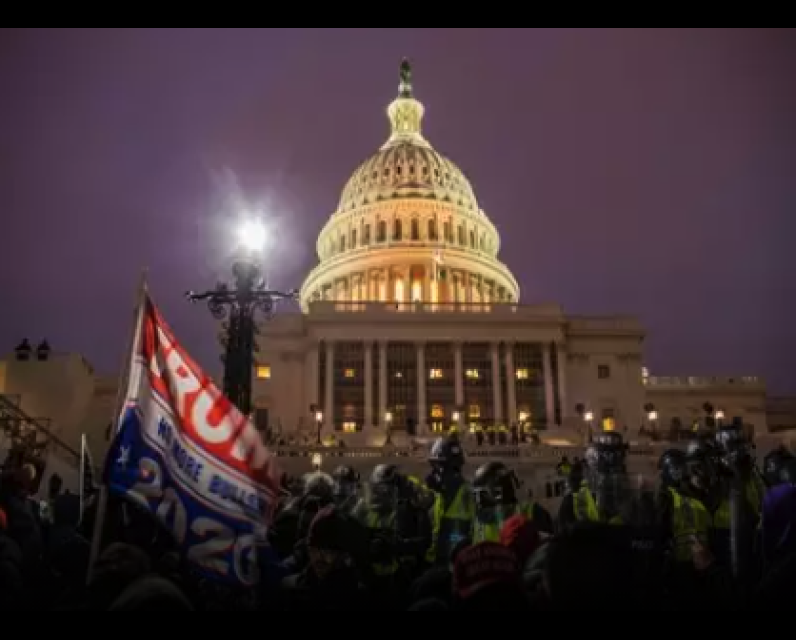Unpublished Opinions
Unpublished.ca is a web portal on politics and current affairs in Canada. It provides the opportunity for Canadians to dig deeper into the issues affecting them, and to weigh-in on these issues in a persuasive and respectful way. Join the movement and have your say today!
Constitutional Law Scholars Reject Trump 1A Defence

The following letter is from US Constitutional Law experts...
Next week the Senate will conduct an impeachment trial to determine whether former President Trump should be disqualified from holding future office for inciting insurrection andvsubverting America’s constitutional democratic process in multiple respects. At that trial, President Trump’s lawyers plan to defend his actions on January 6 by arguing that the First Amendment shields him from conviction. We, the undersigned constitutional law scholars, write to explain why this is wrong.
The First Amendment is no bar to the Senate convicting former President Trump and disqualifying him from holding future office. Although we differ from one another in our politics, disagree on many questions of constitutional law, and take different approaches to understanding the Constitution’s text, history, and context, we all agree that any First Amendment defense raised by President Trump’s attorneys would be legally frivolous. In other words, we all agree that the First Amendment does not prevent the Senate from convicting President Trump and disqualifying him from holding future office.
I. The First Amendment does not apply in impeachment proceedings, so it cannot provide adefense for President Trump.
Many of us believe that the First Amendment simply does not apply here. The First Amendment limits the government’sa bility to make it unlawful to engage in speech, practice a religion, peaceably assemble, or petition the government. Thus,when lawyers say that a defendant established a First Amendment defense in a court case, what they mean is that the defendant demonstrated that the government could not make their conduct unlawful.
But Congress’s power to impeach is not limited to unlawful acts. Instead, federal officers can be impeached for lawful conduct, and violations of an officer’s oath of office can constitute impeachable “high Crimes or misdemeanors” under the Constitution even if no law has been violated. For example, federal judges can be—and have been—impeached for presiding over trials while intoxicated. That is not a federal crime, but it is a violation of the judicial oath to faithfully and impartially execute a federal judge’s duties. Likewise, a President or a Secretary of Defense could be impeached for not defending the United States against a foreign attack. Again, that is not necessarily a violation of any criminal law, but it is certainly a violation of an oath to defend the United States Constitution. And for the same reason, a President could be impeached for publicly renouncing their oath “to preserve, protect, and defend the Constitution of the United States.” Imagine a President who publicly announces, “I no longer promise to preserve the Constitution.” Such a declaration would not be illegal—indeed, the First Amendment would almost certainly bar Congress from making it illegal—but the President could still be impeached for betraying the oath of office.
As a result ,asking whether President Trump was engaged in lawful First Amendment activity misses the point entirely. Regardless of whether President Trump’s conducton and around January 6 was lawful, he may be constitutionally convictedin an impeachment trial if the Senate determines that his behavior was a sufficiently egregious violation of his oath of office to constitute a “highCrime[]or misdemeanor[]”under the Constitution. If so, he can be convicted and disqualified from future office regardlessof whether he would have a First Amendment defense in a subsequent criminal prosecution.
II. Even if the First Amendment applies in impeachment proceedings, it does not prohibit conviction and disqualification for violating the President’s Oath of Office.
Many of us believe that, regardless of whether the First Amendment does or does not apply to impeachment, President Trump can be convicted and disqualified because he is accused of violating his oath through an “extraordinary, unprecedented repudiation of the President’s duties to protect the government” through his “further acts and omissions after he incited the crowd to attack the Capitol”—namely, by allegedly watching the mob storm Congress on television and “not immediately taking action to protect Congress and the Capitol.” While reasonable people can disagree as to the scope of free speech rights in specific contexts (such as the scope of the government’s power to limit its own employees’ public expression), no reasonable scholar or jurist could conclude that President Trump had a First Amendment right to incite a violent attack on the seat of the legislative branch, or then to sit back and watch on television as Congress was terrorized and the Capitol sacked.
On the contrary, the Constitution imposes an affirmative duty on the President to “take care that the laws be faithfully executed,” and willful violations of that duty are an impeachable offense. Accordingly, if the Senate concludes that President Trump willfully failed to intervene to protect Congress from a mob – indeed, one he incited – in violation of the presidential duty to take care to faithfully execute the law, the First Amendment offers him no protection at all from impeachment. The First Amendment protects the freedoms of speech, press, religion, assembly, and petition; it does not grant the President the freedom to engage in a willful dereliction of duty.
III. The President’s speech and conduct around January 6 constitute unprotected incitement.
Even if the principles of First Amendment law are applicable in the impeachment context (and manyof us believe they are not), many of us believe there is an extraordinarily strong argument that the Supreme Court’s standards, articulated in Brandenburg v. Ohio, for when the government may criminally punish an individual’s deliberate incitement of others to engage in imminent lawless acts are satisfied in this case.
President Trump’s speech, and the overall course of his conduct, advanced the factually baseless position that the election had been “stolen” and, further, that immediate action was necessary to prevent Vice President Pence and Congress from counting and confirming the votes of Electors that had been submitted (and certified) by the States. The evidence shows that President Trump deliberately assembled the crowd of supporters; that he steeled his supporters for action and knew that they were ready to take immediate action; that he directed them to take such immediate action; that President Trump said he would be with them in such action and supported such action; that he intended such action to accomplish the unlawful disruption of the constitutional processes of Congress in counting the votes of Electors and certifying the results; and that many persons in the mob that attacked Congress and the Capitol understood themselves to be doing exactly what President Trump had directed and intended for them to do.
In this context and under the circumstances, many of us believe there is a powerful case that even under the Supreme Court’s narrow standards for when speech inciting violence is not constitutionally protected, President Trump’s words and conduct were unprotected. His words and conduct were, in the words of the Brandenburg case, “directed to inciting or producing imminent lawless action and . . . likely to . . . produce such action.”
As scholars of constitutional law, we know there are many difficult questions of First Amendment law. But the permissibility of President Trump’s impeachment trial is not one of them. The First Amendment is no defense to the article of impeachment leveled against the former President, because the First Amendment does not apply in impeachment proceedings; because the president does not have a First Amendment right to incite a mob and then sit back and do nothing as the hostile mob invades the Capitol and terrorizes Congress; or because, in context, President Trump engaged in unlawful incitement. Accordingly, while we express no view here on the ultimate question of whether the Senate should convict President Trump and disqualify him from future office, we urge the Senate not to base its decision on the erroneous understanding of the First Amendment urged by President Trump’s lawyers.



Comments
Be the first to comment